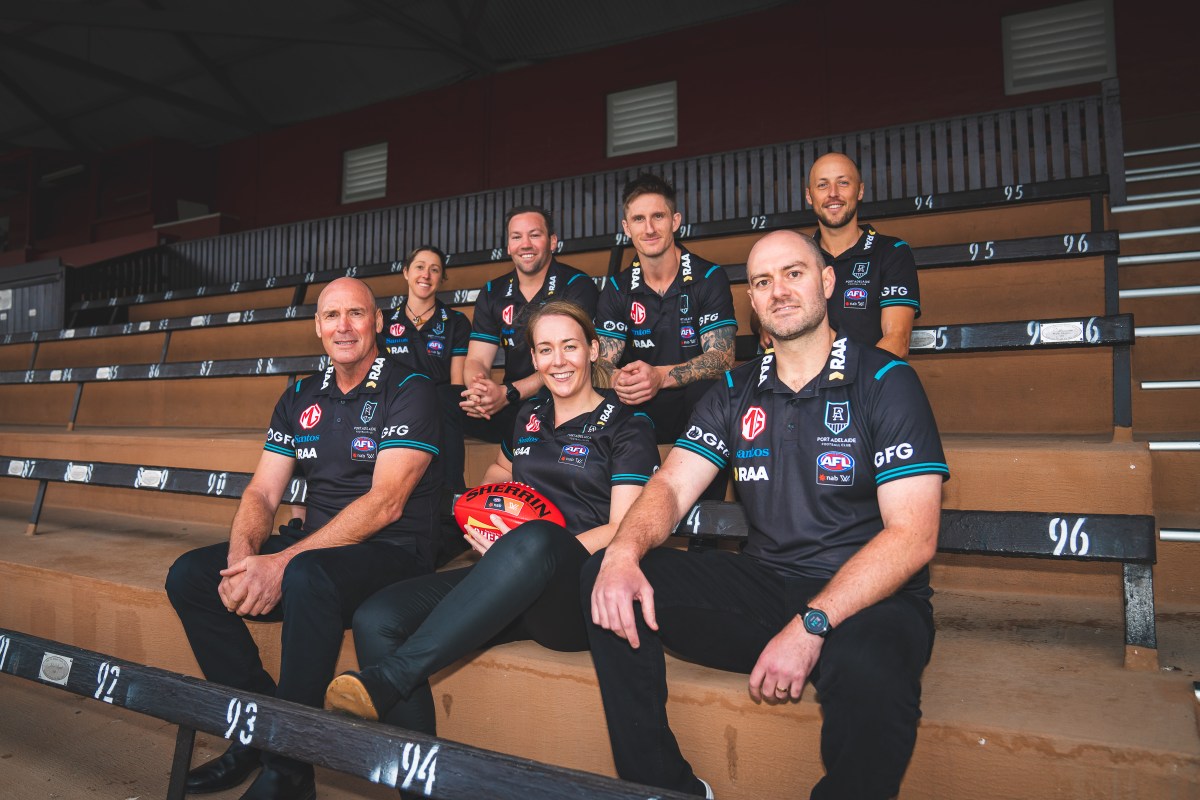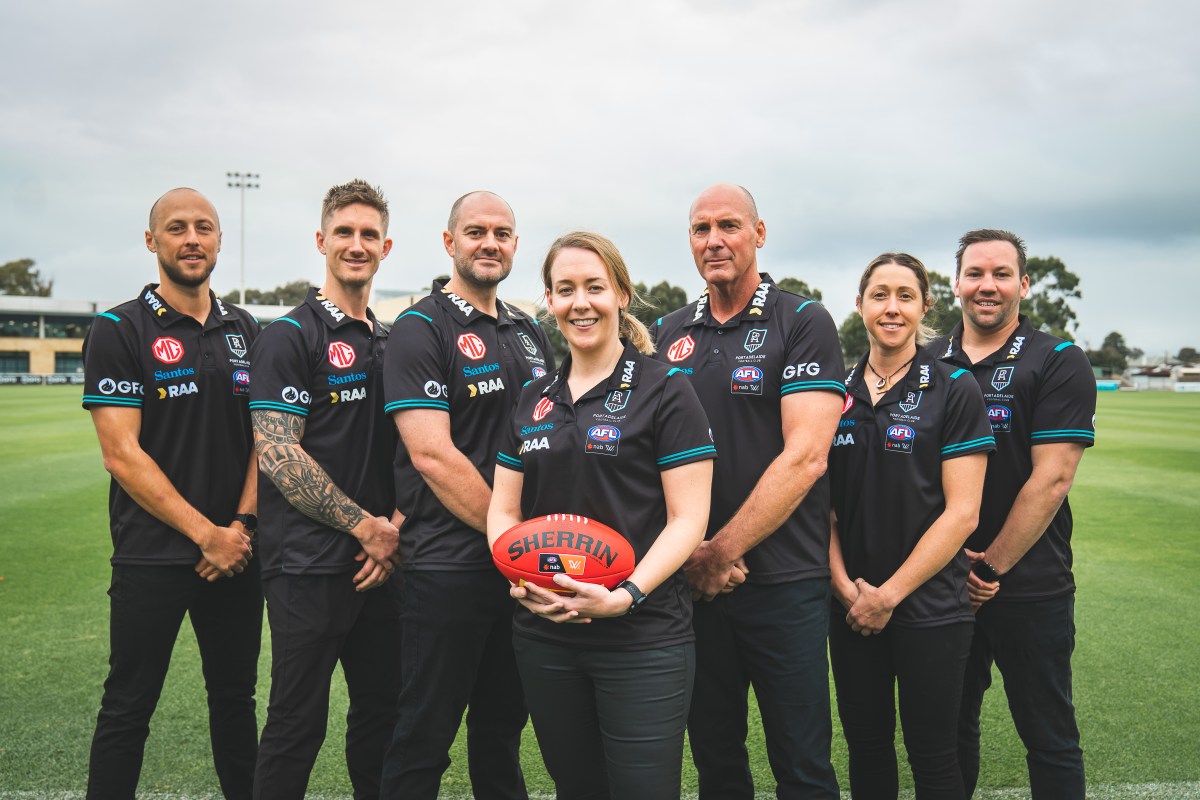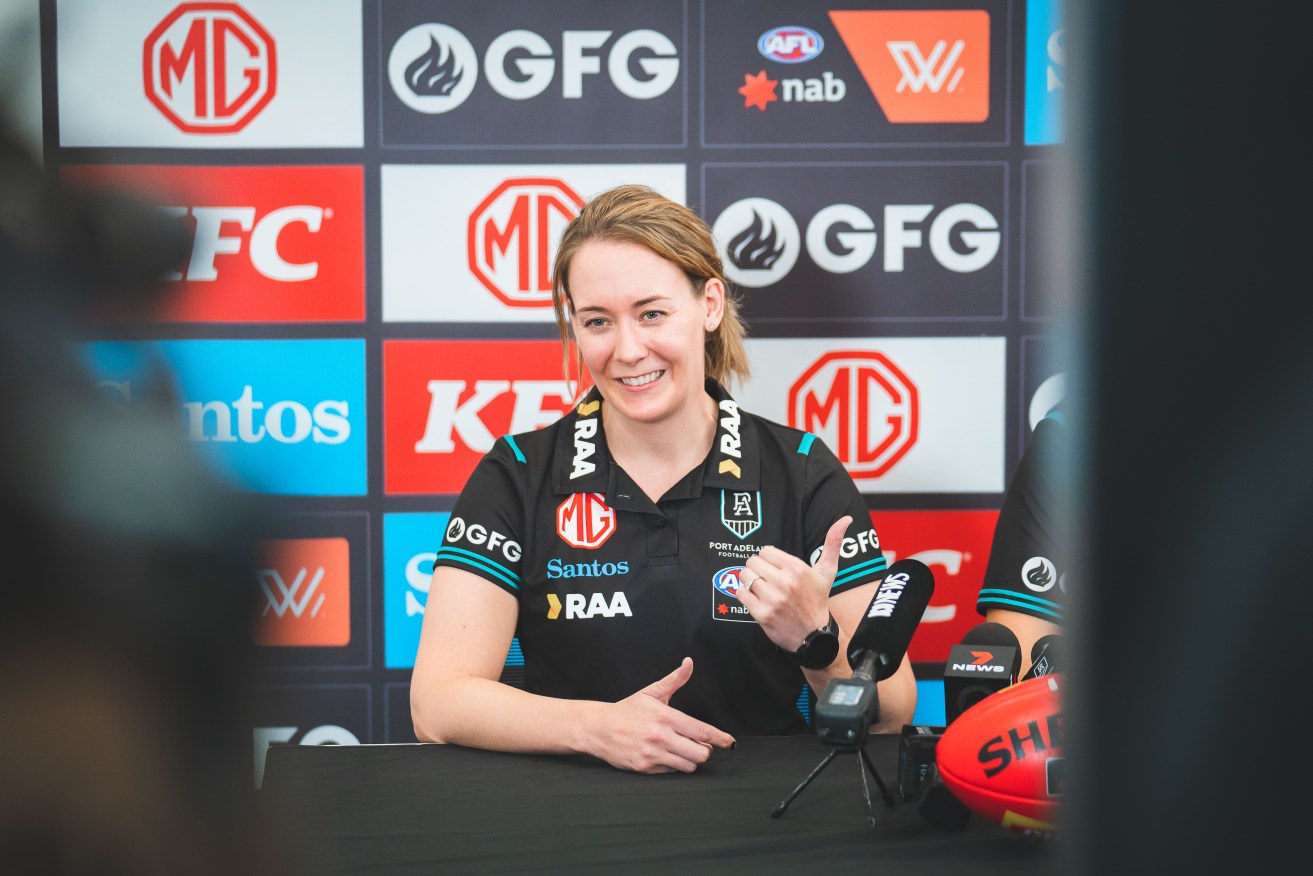Many expected Erin Phillips to be Port Adelaide’s – and the AFLW’s – first playing coach, a theme not known in the AFL since Malcolm Blight’s ill-fated stint at North Melbourne in 1981.
Internally, Port Adelaide Football Club president David Koch two years ago spoke of a “dream” coaching tandem: Erin on the field and her father Greg, an eight-time premiership hero at Alberton, in the grandstands. Romantic, sentimental … but probably not practical regardless of the noted Phillips’ touch of success in Australian, US and Olympic sport.
No-one “inside” Port Adelaide could have offered an alternative to this fairytale script. There is no other extraordinary daughter-father combination to take to the field at Alberton, although it has played out elsewhere in Port Adelaide’s AFLW program. Olympic hockey champion Juliet Haslam, daughter of 1970s player and recent board member Ross Haslam, is the Port Adelaide head of AFLW.
Who could confidently come from “outside” the Port Adelaide circle to emerge as the inaugural AFLW coach and succeed at a club that “exists to win premierships”?
Lauren Arnell.
In many ways, the “outsider” is as close to an Alberton native as there can be outside the club’s LeFevre peninsula heartland. Arnell’s Victorian upbringing in football is very much “Port Adelaide”.
“I used to go to Whitten Oval (during the 1990s) and stand among the cigarette smoke and the tins of VB,” Arnell recalls. “And listen to all the old western suburbs crew abusing the opposition and umpires.
“I was 10. I was the kid who would read everything about the Bulldogs, watch the reserves – we’d be there all day. I knew every player. (Port Adelaide 2004 premiership player and current midfield coach) Brett Montgomery, I have not told him yet, was my favourite Bulldogs player. I’d read the AFL Record, try to memorise their birthdays – that was what I loved. I knew where they all came from.
“That was my upbringing. I have seen Port Adelaide play (SANFL matches) here at Alberton. It is exactly what I grew up in.<
“We were Bulldogs members all the way through,” adds 35-year-old Arnell. Her great uncle, Ray Walker, was 1963 best-and-fairest champion at Footscray, now the Western Bulldogs. “My dad was born the day of or the day after the Bulldogs 1954 (VFL) premiership.”
Arnell also arrives at Alberton pre-conditioned for the intense Port Adelaide-Crows rivalry that will find a new dimension with the first AFLW Showdown, now expected in late September when Adelaide Oval is vacant rather than at the start of the new season in late August.
“My whole upbringing was centred on the 1997 preliminary final loss to the Crows. Worst day ever, tears in my family,” Arnell said.
Arnell’s upbringing – away from football – is true to the Port Adelaide stereotype, the working-class badge of honour worn proudly by those who would have their traditional football jumper defined by prison bars.
Daughter of a policeman, Arnell is the sporty one among the triplets born on March 15, 1987.You could not find three more different people,” says Arnell of her brother Andrew and sisser Moira. “We are pretty diverse.”
Lauren was drawn to team sports when the prospect of playing Australian football was very limited for teenage girls.
“That’s probably not fair on my sister; she was a State-level swimmer growing up,” Arnell says. “My brother (an optometrist) now plays ice hockey. It is the first team sport he has really engaged with; it’s funny. D-league, social, 9.30 Tuesday night in Melbourne.”
Arnell’s life story would have impressed Koch and every other off-field leader at Alberton when Haslam put forward the inaugural Carlton AFLW captain and Brisbane AFLW premiership player as the woman to lead Port Adelaide to a new league. And Koch was adamant long ago that Port Adelaide would start with a woman as a coach in a league dominated by male mentors.
Hard, contested footy. Good kick. High footy IQ. Competitive as hell
“I grew up on a farm (from age 2). Nothing really came easy for us,” recalls Arnell. “North-west of Melbourne. Clarkefield. Riddell Creek. Sunbury. A 50-acre cattle farm. Working class, family values and stick together because you need to. We’d live to ‘get shit done’.
“Kick the footy, shoot the basketball around every afternoon after school. Clean horse shit out of the paddocks every single day; we were on a rotation, three of us kids. Someone had to clean the horse shit every day.
“We were on the farm until I was 15. Dad was a copper in the western suburbs of Melbourne when heroin was seriously influencing society. When ‘Sea Change’ became a TV show and a thing for everybody, Dad decided we’d move to Lake’s Entrance – four-and-a-half hours out of anything I knew – right up the east coast of Victoria.
“As a 15-year-old, it is fair to say I was not impressed. Moving out to a beach town, as triplets, with dad as head of the police station, going into year 11 and 12 at peak teenager years, is a pretty big shift from where we had comes from.
“The three of us had a pretty strict upbringing. We were told we were going to uni. So we did. We all moved out of home at 17. Mum and Dad were four-and-a-half hours east of Melbourne. I moved six hours away to Ballarat for my first year of uni. And I moved in with four people I had never met before. One of the best things I have ever done. It gives you a picture of why change for me is not easy, but I love it. And I feel confident with change.”
Arnell is the poster child of an era – pre-AFLW – when girls found football and Australian football turned them away at 15.
“I couldn’t play (because of a lack of opportunity), so I played basketball. There was no girls’ footy,” said Arnell who had spent “every single lunch time at primary school with the boys: winter was football, summer was cricket.”
At Ballarat, at the start of her university studies in 2005 (12 years before AFLW), then 17-year-old Arnell was like many other teenage girls, preparing to give up on her true love of Australian football to play another sport.
“I was just going to play basketball when I moved from Lake’s Entrance to Ballarat to find a social connection,” Arnell said. “I was pretty shy. I never really went down to the basketball stadium. I didn’t know anyone. And then I met some girls at uni who said they played footy. I said ‘What the hell are you talking about? Where is this women’s footy? And who plays it?’ I have not looked back since.”
The resume is impressive – 10 VFLW premierships with Darebin, three All-Australian honours and prime place in the history books with the start-up of Australian football’s first national women’s competition in 2017.
The pathway is extreme. In 2013, as one of the top-10 female players in Victorian women’s football, Arnell was asked if she would be interested in training with an under-18 men’s team, the Calder Cannons which was loaded with AFL draft prospects such as current Gold Coast midfield star Touk Miller and Essendon ruckman-forward Peter Wright.
“Me, being me, I’ve gone ‘Shit yeah, I’ll do that’,” Arnell said. “There was no other talent development. I was playing club footy that was the best of the Victorian league, but there was no high-performance system involved whatsoever. I was teaching all day at primary school and I was then driving out to Craigieburn, north Melbourne which was about 50 minutes in the car.
“I was 26. I reckon these boys all thought I was 21. I was training with them 2-3 times a week in their pre-season which was amazing. And from that I built connections with the management at the Cannons and they all asked me to coach (the under-18 girls and under-16 boys).
“From there, I was given opportunities to coach the Victorian Indigenous Kickstart team that was essentially a cultural program where you take kids to Darwin for a week – probably the best thing I have ever done in footy, outside of winning a premiership. I was the only non-Indigenous person in that whole program. Seven nights in Darwin and deep diving into want it means culturally for those with First Nations background; that was really, really special.
“Then while I was teaching I would join in school sports, Victoria representative teams … a bunch of girls now in the AFLW, I was coaching them when they were 13, 14, 15.
“Then AFLW started (in 2017), so I put a pause on my coaching because I wanted to focus on playing. I was still working four days a week and coaching development – and then COVID hit. I went back to teaching in Brisbane. (Then Brisbane football chief) David Noble arranged an amazing job for me that was three days teaching and two days at the Lions academy. And I was leading that girls talent pathway at the Lions academy since October 2020.”
Arnell picked up the whistle for the first time as an AFLW senior coach on Wednesday night at Alberton Oval. She had 23 players, the rest are to come in the AFLW draft at the end of the month. The new changerooms under the old grandstand at Alberton Oval are still a work in progress, as is the formation of the inaugural Port Adelaide AFLW squad.

Lauren Arnell with Port Adelaide Football Club staff. Photo supplied
But Arnell, who insists “coaching is in my blood”, has become the complete package in a big-league coaching sense with the school of hard knocks having transformed a shy girl to a confident woman.
“I was a rubbish public speaker, even at the start of uni I would shit myself standing up in front of a group of people,” Arnell said. “But you learn it pretty quick.”
Arnell was forced to find her public voice when the ABC hired her as an “expert” for its AFL radio calls, while fellow AFLW pioneer Daisy Pearce did the same on Melbourne radio with 3AW.
“That’s what AFLW did – create opportunity. It gave me the chance to sit on a grand final panel in 2016 when the Bulldogs won that premiership … before the first pre-season of AFLW. That led to a meeting with (then ABC sportscaster) Gerard Whately and ended up having coffee with Gerard and his asking, ‘What can you do on radio?’
“AFLW set up that opportunity for Gerard Whately to dial up and say, ‘Want to have a coffee?’ And then within a few months I am an expert for men’s footy on ABC radio and have been ever since.”
Learning the “Port Adelaide way” – a style of football that Port Adelaide people believe defines Port Adelaide to be different to others – has come quick too. Arnell recently met with Port Adelaide’s record-breaking SANFL coach and inaugural AFL mentor, John Cahill.
“We exist to win premierships, 100 per cent. Our list will reflect that,” Arnell said. “I was fortunate enough to meet with Jack Cahill a couple of weeks ago. The Port Adelaide trademarks of what kind of player comes into our men’s and women’s program – you will see a correlation between the two. Hard, contested footy. Good kick. High footy IQ. Competitive as hell. You will see that across both programs.
“Jack said: ‘We weren’t dirty but if there was a ball to be won you go to win it’. That is certainly how I will be coaching. Win one on one.”
As the sun was setting on Alberton on Wednesday, Arnell’s enthusiasm was rising while the first AFLW training session for Port Adelaide became a new chapter at an old club previously known only for male players.

Lauren Arnell with Port Adelaide Football Club staff. Photo supplied
“I am bloody excited for it; there is a lot of energy,” Arnell said. “We have star players, you know the big names (in particular Erin Phillips) at the footy club. We have this core group of players who are just fighting because they have put in so much work. They have been just getting a game; there’s a couple there who have been on the fringe of a premiership midfield. They want to come in and own their space. First game is going to be unreal. I am keen to find out where and when. Hopefully, it is here (at Alberton Oval).”
Across the oval, in the men’s changerooms, the theme of the past three years has been “connection”. It echoes to the AFLW program led by Arnell.
“Our theme is connection, on and off the field,” Arnell said. “My role is to create an environment where our players and our staff can connect. Players on and off field, if I can facilitate an environment where they can connect we will see the best of them.
“(I am taking from) the experiences I have had across my whole career, but more particularly in AFLW. I helped build Carlton, won a premiership in Brisbane and did not miss a game but also went from captain at Carlton to the least-important person in the room who needed to be traded.
“The depth of experience – the humility you gain from the experience like that is unmatched when you become a coach. That was a real strength of mine when I went to the Lions. My ability to really understand my team-mates who were in or out of the team. That translates to a coach 100 per cent.
“A lot of our players are coming from clubs that did not see value in keeping them. I have lived that. For me it is really exciting to provide a high-performance space for them, an inclusive space for them so that they can feel they can be themselves in every moment.
“A key message from me and (Port Adelaide AFLW list manager) Naomi Maidment to the players we have brought in is, you have to be wanting to be the hardest worker in the room every single day. But it is not just for you – you have to bring the person next to you along. We feel comfortable and confident that we have a group of players who are able to do that. Some players, some athletes at times may not have the capacity to bring others along with them. We feel we have that in our group.”
Port Adelaide is among the four last entries to the 18-team AFLW, along with Essendon, Hawthorn and Sydney. There is still that lingering question of whether Port Adelaide’s preference to focus on China in 2016 rather than AFLW has put Arnell and her crew on a more difficult path as the “last in, worst dressed”?
“Depends who you ask,” replies Arnell. “I prefer to be an optimist. I see opportunity in everything. For us the opportunity is we can learn so much from the wins and the fails of other clubs.
“Whether that is the original group of clubs that came in 2017 or whether it is the gradual expansion teams of the past few years. There is so much learning in that for us. As a teacher, I am a big believer that if you can learn from other people’s mistakes you’re then slightly ahead of your own.”
Even while carrying pain from the Crows in 1997, Arnell has developed a non-aggressive theme for the much-anticipated first AFLW Showdown – one that honours women who were denied the chance to play Australian football.
“We would love that first Showdown to be not just about women in footy in SA; let’s bring in those like our Olympians, Juliet Haslam and (Port Adelaide AFLW operations manager) Rachel Sporn who never got a look in with footy,” Arnell said.
“All of those women who have been incredible athletes and adminstrators in SA women’s sport. Let’s welcome them in to our first Showdown. Let’s make it more than just AFL, not just about Port Adelaide and the Crows. Let’s make it about female sport in South Australia.”





